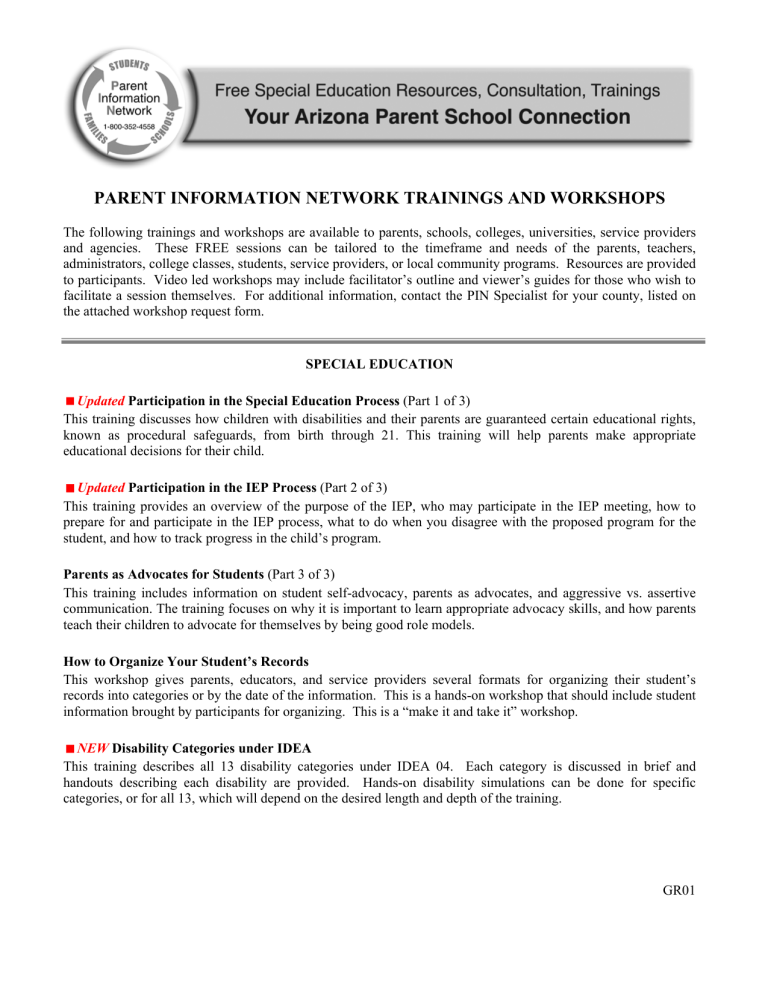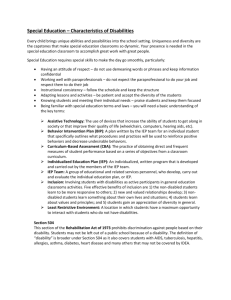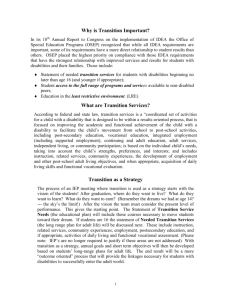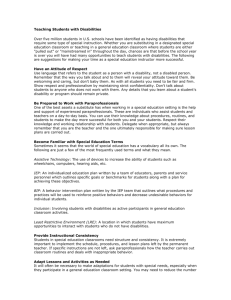GR01 PIN Trainings and Request Form

PARENT INFORMATION NETWORK TRAININGS AND WORKSHOPS
The following trainings and workshops are available to parents, schools, colleges, universities, service providers and agencies. These FREE sessions can be tailored to the timeframe and needs of the parents, teachers, administrators, college classes, students, service providers, or local community programs. Resources are provided to participants. Video led workshops may include facilitator’s outline and viewer’s guides for those who wish to facilitate a session themselves. For additional information, contact the PIN Specialist for your county, listed on the attached workshop request form.
SPECIAL EDUCATION
Updated Participation in the Special Education Process (Part 1 of 3)
This training discusses how children with disabilities and their parents are guaranteed certain educational rights, known as procedural safeguards, from birth through 21. This training will help parents make appropriate educational decisions for their child.
Updated Participation in the IEP Process (Part 2 of 3)
This training provides an overview of the purpose of the IEP, who may participate in the IEP meeting, how to prepare for and participate in the IEP process, what to do when you disagree with the proposed program for the student, and how to track progress in the child’s program.
Parents as Advocates for Students (Part 3 of 3)
This training includes information on student self-advocacy, parents as advocates, and aggressive vs. assertive communication. The training focuses on why it is important to learn appropriate advocacy skills, and how parents teach their children to advocate for themselves by being good role models.
How to Organize Your Student’s Records
This workshop gives parents, educators, and service providers several formats for organizing their student’s records into categories or by the date of the information. This is a hands-on workshop that should include student information brought by participants for organizing. This is a “make it and take it” workshop.
NEW Disability Categories under IDEA
This training describes all 13 disability categories under IDEA 04. Each category is discussed in brief and handouts describing each disability are provided. Hands-on disability simulations can be done for specific categories, or for all 13, which will depend on the desired length and depth of the training.
GR01
BEHAVIOR, SOCIAL SKILLS AND SELF-ESTEEM
Updated How to Stop Bullying Before It Starts
This workshop addresses early warning signs of victimization and bullying, plus some of the effects bullying has on the school and home. Suggestions will be given for parents, teachers and administrators to help the victim and the bully. Participants will receive several reproducible handouts/overheads for school and home.
Learning Disabilities: How Difficult Can This Be?
(Video, 70 min, viewers guide) (Part 1)
This video is also known as the F.A.T. City Workshop (Frustration, Anxiety, and Tension). This video led workshop is helpful in providing an understanding of learning disabilities. Auditory processing and visual perception deficits are among the disabilities that are demonstrated. Intense and informative!
NEW Beyond F.A.T. City, A Look Back, A Look Ahead (Video, 70 min, viewers guide) (Part 2)
Lavoie’s 70-minute discussion is filled with powerful insights and practical strategies on coaching and teaching, building self-esteem, creating individualized education plans, imparting accountability, home schooling, parental responsibility, and much more.
Learning Disabilities and Social Skills: Last One Picked
-
First One Picked On (Video, 68 min, viewers guide)
Adults working with students with learning disabilities are aware of the isolation and social rejection faced by many of these children. The video led workshop illustrates some of the social problems and offers practical solutions and skills that can be taught.
Learning Disabilities and Discipline: When the Chips Are Down (Video, 62 min, viewers guide)
This video led workshop focuses on the behavioral management of students with learning disabilities including practices that work and practices to be avoided.
Learning Disabilities and Self-Esteem: Look What You’ve Done!
(Video, 66 min, viewers guides)
This video led workshop provides stories of hope and the resilience of children. It targets students with learning disabilities and the building or tearing down of children’s self-esteem. The stories give viewers an excellent opportunity to relate their own experiences to those in the video.
Tips for Developing Organizational Skills
This training offers tips and strategies to help diminish frustration, anxiety and possible behavior problems by improving organizational skills in the classroom or at home. These tips are broken down into five different categories where organization can improve studying, learning, and memory skills through the use of routines, systems, and color.
NEW ADHD in the 21 st
Century
(Video 1, 55 min, viewers guide) Kids and ADD - Dr. Edward Hollowell explains what he believes is the key to successfully dealing with kids with ADD. He explains how teachers, parents, and family members can understand and cope with ADD, which affects nearly 5 million kids in the U.S. today.
(Video 2, 45 min, viewers guide) ADD Goes To School - Today it is estimated that 2 out of every 20 kids in the classroom has ADD. They used to be called "behavior Problems"- or just plain bad, before they were diagnosed.
This video explains what parents and teachers can do to help students meet with success in the classroom and at home.
2
Social Skills
This workshop covers the social skills of children from ages 3-18. It discusses the differences of children with and without disabilities, and what role social skills play in their lives at school and at home. Strategies for parents and teachers are given to improve social skills, as well as how to recognize poor social skills early for intervention purposes.
NEW What the Silenced Say (Video, 90 min, viewers guide)
In this video workshop Jonathan Mooney speaks honestly as about his experience as a student with dyslexia and hyperactivity who did not learn to read until he was twelve. Jonathan describes how he moved from feeling
"stupid and crazy" to ultimately graduate with a 4.0 grade point average in English literature from Brown
University. This workshop is for students, staff, and professionals.
NEW It’s So Much Work to Be Your Friend: Helping the Learning Disabled Child Find Social Success
(Video, 90 min, viewers guide) This video workshop by Rick Lavoie discusses the challenges students with learning disabilities face socially at school, home and around the community. Lots of strategies for classroom and home are discussed.
COMMUNICATION
Building Positive Relationships
This training provides information on how to make team building a success by addressing stages of group development, roles of group members, barriers to having an effective team, and how to recognize an effective team. Participants will learn their individual personality styles and how they can contribute to the team; and why building positive relationships is necessary in special education.
How to Help Your Child Succeed in School; Strategies and Guidance for Parents of Children with ADHD and/or Learning Disabilities (Video, 60 min.)
In this video workshop, parents are introduced to strategies for improving reading, writing, math, organizational, and study skills to help their child achieve school success and reach their potential.
NEW How to Start a Parent Group
Learn what considerations are necessary in organizing a parent support/resource group: planning, staffing, marketing, collaborating, communication, and networking. This is a great initial process for any group.
Parents Promoting Success in School and at Home
When individuals communicate with others, they communicate not just with words, but also with their body language. This training covers a variety of communication issues between parents and school; and also includes parent involvement and viewpoints from both teachers and parents.
TRANSITION
Updated Early Childhood Transition
Participants will learn the differences between Child Find, the Arizona Early Intervention Program, preschool special education and special education. Parents and professionals will learn strategies for making a smooth transition between early intervention and preschool services.
Full Life Ahead Arizona! A Guide to Adult Life for Students and Families of Students with Disabilities
This workshop is tailored to the transition needs of youth with disabilities. Students, families, and educators will learn strategies to address transition topics including; education, independent living skills, employment, decision making, and legal rights and responsibilities.
3
Updated Student Participation in the IEP
This training teaches students how to advocate for themselves, how to prepare for the IEP, how to participate in the IEP meeting as a team member, how to recognize their own learning style and educational needs, and how to prepare for transition needs. This training can be used with students and for staff wanting to implement these strategies in the classroom. Helpful worksheets and ideas (including questionnaires for the student, parent, and teacher) are incorporated into this training to use individually or with a group of students.
Transitions to Post Secondary Learning (Video, 45 min.)
This video led workshop focuses on eight college students with LD and/or ADD/ADHD who discuss their transition from high school to post secondary environments.
The contents of this publication were developed by the Parent Information Network and revised in May 2006 by Tina Swearingen under contract #ED05-0053-02 with funds allocated by the U.S. Department of Education under IDEA '04. These contents do not necessarily represent the policy of the agency, nor should endorsement by the federal government be assumed. The Arizona Department of
Education of the State of Arizona does not discriminate on the basis of race, religion, color, national origin, sex, disability or age in its programs, activities or in its hiring and employment practices. The following person has been designated to handle inquiries regarding the non-discrimination policies: Deputy Associate Superintendent of Administrative Services, 1535 W. Jefferson, Phoenix, AZ 85007
(602) 542-3186. This document is in the public domain and may be freely reproduced in its current format. For more information, call the Parent Information Network at (602) 542-3852 or 800-352-4558. GR01
4
Parent Information Network
Training and Workshop Request Form
1. Requestor’s Name: ___________________________________________ Title: ________________________
Phone: __________________ E-mail or Mailing Address: _____________________________________
2. Topic(s): (refer to the PINS Trainings and Workshops List) _________________________________________
__________________________________________________________________________________________
3. Why do you feel this training is needed? _______________________________________________________
__________________________________________________________________________________________
4. Expected outcomes of training: ______________________________________________________________
__________________________________________________________________________________________
5. Number of Participants (circle one) 5-15 16-25 26-35 36-45 46-60 61-99 100+
6. Name of District, School, or Agency: ___________________________________________________________
7. Preferred Date(s): 1 st
choice __________________________, 2 nd
choice _____________________________
Preferred Time(s): 1 st
choice ______________, 2 nd
choice __________________
8. Suggested Location of Training (should be wheelchair accessible) ___________________________________
__________________________________________________________________________________________
____ Yes, I will participate in a follow up survey, providing feedback on results of this training.
____ If no, please explain: _____________________________________________________________________
__________________________________________________________________________________________
Please e-mail or fax this request to the PIN Specialist for your county
Apache & Navajo
Jana Bays
Phone: 928-537-0250
Fax: 928-532-8805 jbays@frontiernet.net
Coconino, Mohave, &
Yavapai
Allison Meritt
Phone: 928-289-5834
Fax: 928-289-5834
merittpin@cableone.net
Cochise, Graham, &
Greenlee
Parent Information Network
Phone: 602-542-3852
Toll Free: 800-352-4558
Fax: 602-542-5404
East Maricopa (480 area code)
Barbra Ross
Phone: 480-607-3030
Fax: 480-443-0351 barbraross@cox.net
Gila & Pinal
Tina Swearingen
Phone: 520-836-3023
Fax: 520-836-0428 tswearingen@gmail.com
La Paz & Yuma
Teri Rademacher
Phone: 928-344-0141
Fax: 928-344-1373
trademacher@adelphia.net
Pima & Santa Cruz
Kristie Melkers
Phone: 520-225-7377
Fax: 520-219-9512
k_melkers@comcast.net
West Maricopa (623 / 602 area codes)
Sharon Moeller
Phone: 480-288-1245
Fax: 480-474-2243
Sharonstime3@aol.com
Rev.5/31/06
5






